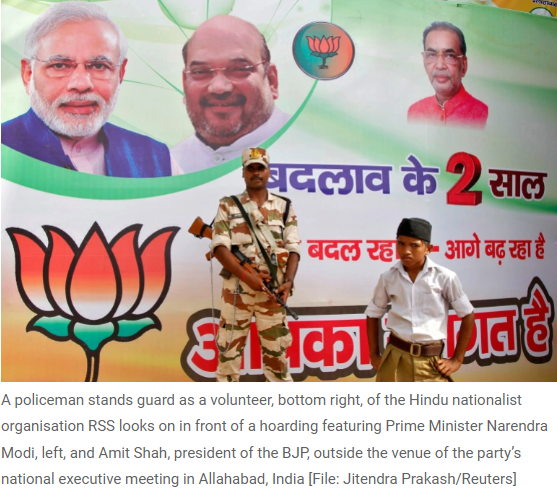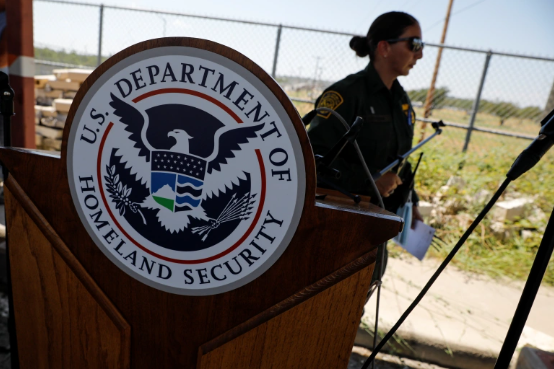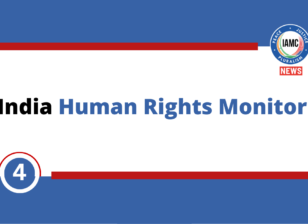Concerns as US DHS hires leader of Hindu nationalist-linked group
The appointment of Chandru Acharya to the DHS faith-based Security Advisory Council shows ‘ignorance’ of the US government, activists and academics say.
The recent appointment of a Hindu nationalist community leader to an interfaith council under the United States Department of Homeland Security (DHS) has raised “concern”.
In September, the DHS appointed Chandru Acharya – a director at the Hindu Sawamsayvak Sangh (HSS) – to their Faith-Based Security Advisory Council, a 25-member council that provides the federal department with “advice and recommendations”.
But activists and academic groups in the US have raised concerns about HSS’s association with the Rashtriya Swayamsevak Sangh (RSS), an Indian Hindu supremacist organisation that aims to make India, a multicultural and secular democracy, a Hindu Rashtra (nation).
According to the London-based outlet Middle East Eye, Acharya confirmed his association with the HSS, which describes itself as an apolitical organisation engaged in cultural and religious issues within the Hindu community, but denied any affiliation between the HSS and the RSS.
He also told the Middle East Eye, “If members of the RSS abandon the core philosophy of Hinduism and think that they are superior to others, they are supremacist.”
Growing influence of Hindu far right
Rashid Ahmed is the executive director of the Indian American Muslim Council (IAMC), which has been raising the alarm about the growing influence of the Hindu far right in the US.
He told Al Jazeera that the “concern” was not about Acharya “as a person”, but about his association with a group inspired by the RSS.
Founded in 1925, the RSS is a proponent of Hindutva ideology, which believes in the dominance of the Hindu faith and culture in India and considers Muslims and Christians to be an obstacle to the goal of achieving a Hindu nation.

According to its website, the HSS “owes its inspiration” to the RSS.
“HSS USA is … inspired by a long lineage of Hindu movements in India, including the Rashtriya Swayamsevak Sangh (RSS), which have helped rejuvenate the society and take Hindu civilization forward,” the website read.
“HSS USA may not necessarily agree with all that these organizations and leaders espouse, but we take inspiration from their larger vision and the spirit for preserving, restoring, and advancing Hindu culture, ideals, and values,” it added.
The HSS, which operates in nearly 40 countries and has more than 170 chapters in the US, has organised events featuring members of the RSS and its affiliates, including its current chief Mohan Bhagwat.
It also sponsored an event in the US state of Georgia in August where Sadhvi Rithambara, a leading member of the Vishwa Hindu Parishad (VHP), an RSS-affiliated organisation the CIA has labelled a “militant religious outfit”, was the speaker.
Rithambara is known for her xenophobic and anti-minority rhetoric. In 1995, she responded to accusations that a Christian missionary was attempting to convert Hindus, by telling India Today magazine: “If a single choti or janeu (Hindu sacred thread) is cut, Christians will be wiped out from the face of India.”
Her speeches during the 1990s, which were widely distributed on audio cassettes, were described by researcher Tanika Sarkar as “the single most powerful instrument for whipping up anti-Muslim violence” in India.
US concerns regarding religious freedom in India
Several people with links to the HSS were also behind a 2019 rally in Texas in which Indian Prime Minister Narendra Modi and then-US President Donald Trump addressed a crowd of tens of thousands.
The RSS is the parent organisation of Modi’s governing Bharatiya Janata Party (BJP). Since Modi came to power in 2014, attacks against Muslims and other minorities have increased.
Earlier this year, the US Commission on International Religious Freedom (USCIRF) called for India to be put on a US list of countries accused of religious freedom violations, arguing that religious rights and freedoms had “significantly worsened” there.

Acharya denounced the USCIRF report, describing it as an attempt to “brand the vast majority of peace-loving and pluralistic Hindus as extremists”, according to news outlet Indian Express.
Al Jazeera reached out to Acharya via email on October 18 but did not receive a response by the time of publication.
On October 16 Al Jazeera also reached out to the HSS but received no response.
A request for comment by Al Jazeera to the DHS, on October 15, also went unanswered.
‘Widespread ignorance’
Rohit Chopra is a professor at Santa Clara University in California who has researched the Hindu far right in India.
He said the DHS decision to appoint Acharya “reflects a widespread ignorance about the pernicious ideology of Hindu nationalism”.
Hindu nationalist groups have sought “more legitimacy and visibility in American public and political life”, he explained, with some hiring PR firms to make their ideology “palatable” by highlighting ideas of “Hindu tolerance, pluralism and the like”.
“Acharya’s position is a reflection of those efforts paying off to an extent,” Chopra added.
In recent years, US-based academics and activists have faced harassment for highlighting the growing influence of Hindu nationalist groups.
The Washington Post reported that US-based scholars who had organised an online conference in October 2021 titled, Dismantling Global Hindutva, faced intimidation and death threats.
Nikhil Mandalaparthy, the deputy executive director of Hindu for Human Rights, an advocacy group that fights for religious pluralism in the US and elsewhere, said, “Hindu nationalism should not be seen as a foreign issue … [It] is showing up in our local communities – it’s a domestic issue.”
Audrey Truschke, an associate professor of South Asian history at Rutgers University, said the decision to appoint Acharya “misfires gravely” if the goal was to gain a “broad-based Hindu perspective”.
Truschke pointed out that there are many Hindus “who fight against the supremacist, violent ideas encompassed within Hindu nationalist ideology”.
“The DHS may come to realise its error, especially if Hindu nationalist aggressions continue to grow in the US as per the trend of the last few months,” she added, citing the example of a violent incident in Anaheim in August in which protesters opposing Hindu nationalism in India were attacked during an Indian Independence Day parade.
There was no evidence that HSS USA was involved in those incidents.
But according to the IAMC’s Rashid, it revealed that “Hindutva fascism is as dangerous and powerful in the West as it is in India.”
“The West needs to wake up to this divisive and hateful ideology that is seeping into our cities and states,” he told Al Jazeera.
Courtesy: AL JAZEERA


